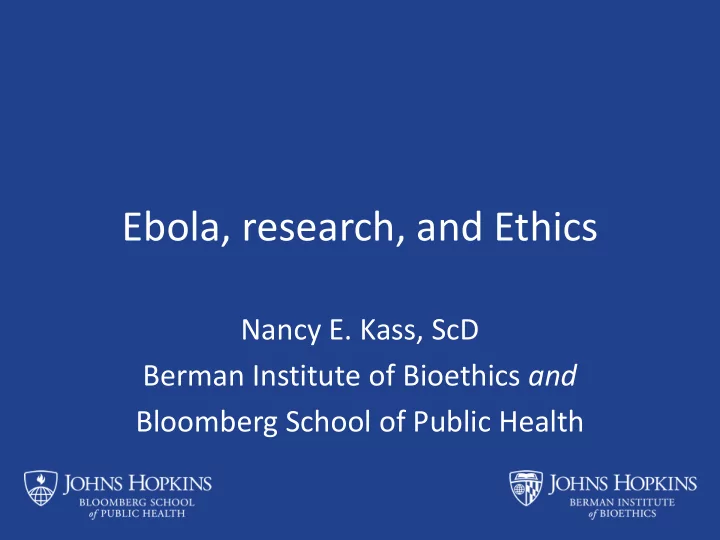

Ebola, research, and Ethics Nancy E. Kass, ScD Berman Institute of Bioethics and Bloomberg School of Public Health
Outline for today • Quick overview: framework for public health ethics • Ethics and testing of experimental vaccines • Ethics and testing of experimental treatments • And what else should we be thinking about in research, ethics, and Ebola?
Public health ethics framework • What is the goal of the proposed program? • What (and how much) relevant data are there? • What are the risks/burdens/concerns ? • How can they be minimized /least burdensome option? • What are justice/fairness implications? • If controversial, what approaches to further procedural justice ?
Questions about ethics and vaccine trials • Who is the right target population? – Populations at greatest risk (with highest incidence)? – Populations to whom we owe most protection? • Should trials be placebo controlled? • What else must be provided in vaccine trials? • Should research target population be same as priority population for vaccine roll out?
Questions about vaccine studies • Who is right target population? – HCWs? • Duty of reciprocity to help them • They can best understand uncertainties, placebo, etc. • But potentially low transmission rate (African HCWs higher incidence rate??) – Household members of Ebola patients? • At greater risk; little protective equipment • Will get answer more quickly
What else must be provided to participants? • Personal protective equipment? – Especially to African HCWs • To family members? – Health education – Chlorine?
Should trials be placebo controlled? • How else can we learn if the vaccines work? • No point doing research if question cannot be answered – Placebo especially important where incidence rates are so low. • Validity question: should we also be monitoring baseline immunity? – Might at-risk populations have mounted natural immune response?
Treatment trials • What is the right design, ethically? • Some say to give treatment to all (no placebo) – “unethical” to deny potentially lifesaving treatment to people who need it • NIH trial planned with placebo – We need to find out if something works; not unethical if we don’t know whether it works – Ethical duty to learn what works
Treatment trials • Ethical tension: – Efficient trial --learn as quickly as possible, with rigorous methods allowing valid results – Compassionate to those who want access • Ethics is not just figuring out which side poses better arguments – Are there other options besides everyone gets drug or 50:50 randomization?
Other options? Adaptive approaches • Incorporate what we learn as we learn it • E.g., Adaptive approach #1: – E.g., pre-trial: experimental drug to 40 sick patients – If dramatic (“magic bullet”) then no placebo needed – If unclear, need to use placebo, but less troubling to use placebo when efficacy unclear! • E.g., Adaptive approach #2: – Randomize patients to different experimental treatments and to placebo
What else must be provided to participants? • Supportive care? – May be more important (“compassion”) than access to experimental therapies
What other kinds of research needed, ethically? • How to prevent Ebola from spreading? What approaches and messages work? – Much local engagement, advice, collaboration EARLY – Where do people get formal/informal information? – Who is trusted (formal and informal)? – What can we learn from other efforts (HIV, TB, etc.) – Creativity • Street theater, radio announcements, YouTube, texts • Research here also essential to reducing EBV now and in future outbreaks
What else will help now and in future outbreaks? • Can research and collaborations leave health systems stronger than before? • Will more local people be trained? • Will local internet connectivity be improved?
Recommend
More recommend